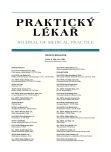Stressful situations such as the patient’s physician: communication, examination, experience, ethics
Authors:
F. Irmiš
Authors‘ workplace:
Psychiatrie a psychosomatika
; Praha
5
Published in:
Prakt. Lék. 2012; 92(2): 101-104
Category:
Of different specialties
Overview
The work deals with stressful situations doctor-patient (LP). His knowledge may unconsciously interfere with communication on both sides. LP recognizes the auxiliary non-specificity of objective tests, perceives diversity of views on diagnosis, lack of time. Aware of the importance of the process of the disease for diagnosis, due to the potential mismatch between clinical, laboratory and subjective. And the ignorance of individual constitutional reactivity in diagnoses and treatment of the average results of research, comprehensive medical difficulty. Perceives reductionism in specialization, underestimation biosociálního terms, disorders information.
It discussed the issue of atypical diseases, ethics, unconventional medicine, healing, spiritual aspects of ignorance. LP after a history of serious illness gaining a better understanding and empathetic approach to the patient.
Keywords:
doctor-patient, non-specificity of objective methods, communication disorders, average or individual.
Sources
1. Baštecký,J., Šavlík, J., Šimek, J. Psychosomatická medicína, Praha: Grada Avicenum, 1993, s. 363
2. Haškovcová, H. Lékařská etika. Galén 1994, s. 230.
3. Haškovcová, H. Práva pacientů. Komentované vydání. Nakladatelství Aleny Krtilové, Havířov 1996, s. 176.
4. Honzák, R. (pořadatel): Kde se stala chyba? Kazuistiky I: Galén 1997, s. 122.
5. Honzák, R. Komunikační pasti. Praha. Galén 1999, s. 176.
6. Irmiš, F. Výroky lékařů, které mohou pacienta stresovat. Prakt. Lék. 1995, 75, s. 593-595.
7. Irmiš. F. Spiritualita v medicíně a psychosomatice: biopsychosociálněduchovní hledisko. Prakt. Lék. 2001, 81, s. 465-468.
8. Irmiš, F. Individuální norma a kvalitativně-kvantitativní dynamika nemoci: mezi „objektivním“ a „subjektivním“. Prakt. Lék. 2004, 84, s. 105-107.
9. Irmiš, F. Mezi objektivním a subjektivním, stres pacienta, psychosomatika. Prakt. Lék. 2010, 90, s. 358-362.
10. Janke,W. (Ed). Response variability to psychotropic drugs. Oxford: Pergamon Press, 1983.
11. Kirch, W. a kol. Chybné diagnózy ve vnitřním lékařství. Martin: Vydavatelstvo Osveta, 1995, s. 339.
12. Linhartová, V. Praktická komunikace v medicíně. Pro mediky, lékaře a ošetřující personál. Grada Publisching, 2007, s. 152.
13. Sacks, O. Na čem si stojím (A Leg to Stand On), Praha, Makropulos, 1997.
14. Strauss, A., Corbinová, J. Základy kvalitativního výzkumu. Boskovice, Albert 1999, s. 202.
15. Tate, P. Příručka komunikace pro lékaře. Jak získat důvěru pacienta, Praha: Grada Publisching, 2005, s. 164.
Labels
General practitioner for children and adolescents General practitioner for adultsArticle was published in
General Practitioner

2012 Issue 2
- Advances in the Treatment of Myasthenia Gravis on the Horizon
- Hope Awakens with Early Diagnosis of Parkinson's Disease Based on Skin Odor
- Memantine in Dementia Therapy – Current Findings and Possible Future Applications
- Memantine Eases Daily Life for Patients and Caregivers
- Possibilities of Using Metamizole in the Treatment of Acute Primary Headaches
-
All articles in this issue
- Basics of social cognitive and affective neuroscience; XIV. Cultural neuroscience
- Characteristics of acute poisoning in the elderly in the Czech Republic; Experience of the Czech Toxicological Information Centre in Prague
- Gluten enteropathy
- Primary prevention in general practitioner surgeries
- A use of epidemiology data for cancer risk assessment and the precautionary principle
- Primary care in the Czech Republic in years 2005–2010
- Stressful situations such as the patient’s physician: communication, examination, experience, ethics
- Electronic documentation for nursing diagnostics in home care
- Subliminal perception, medicine and addictive diseases
- Evaluation of needs of terminally ill patients in home care: a pilot study
- General Practitioner
- Journal archive
- Current issue
- About the journal
Most read in this issue
- Gluten enteropathy
- Subliminal perception, medicine and addictive diseases
- Primary prevention in general practitioner surgeries
- Electronic documentation for nursing diagnostics in home care
